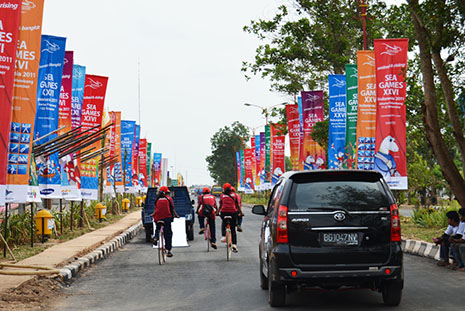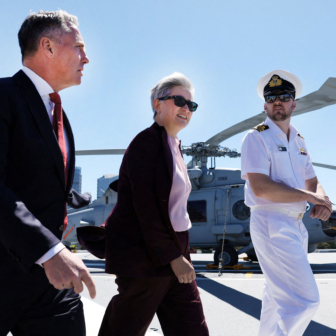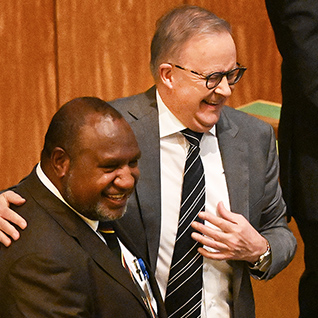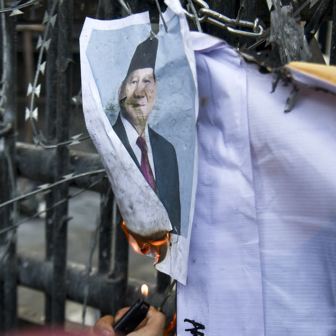THE twenty-sixth Southeast Asian Games kick off tomorrow night with what promises to be an impressive opening ceremony in the Indonesian city of Palembang, which is co-hosting the event with Jakarta. As the auspicious opening date (11/11/11) was chosen to imply, the games – involving Brunei, Cambodia, East Timor, Laos, Malaysia, Myanmar, the Philippines, Singapore, Thailand, Vietnam and Indonesia – are designed to tell an uplifting story of national progress and regional friendship. Indonesia also sees the event as a unique opportunity to reassert its traditional leadership of ASEAN, the Association of Southeast Asian Nations – a hope reflected in the games’ slogan, bersatu & bangkit (united and rising) and in the opening ceremony’s evocation of the ancient maritime kingdom of Srivijaya, which was centred in the vicinity of modern-day Palembang.
But in the lead-up to the games – just like in the lead-up to the previous games, two years ago in Laos – these claims of past and future greatness were overwhelmed by tales of woe. As preparations entered their final month, the Hong Kong–based Asia Sentinel summed up the controversies that threatened to derail the event under the unambiguous title “Indonesia’s Games Mess.” “Instead of a source of national pride,” the website reported, “the games have become a national embarrassment riddled with corruption, delays and mismanagement that has nearly wrecked President Susilo Bambang Yudhoyono’s Democratic Party and brought down a host of other officials and politicians.”
At the centre of the controversy has been the Democratic Party treasurer, Muhammad Nazaruddin, who is accused of accepting US$3 million in bribes on tenders for the construction of the athlete’s village in Palembang. Other senior officials, including the secretary of the Ministry of Sports, have also been suspended or arrested. The first prosecutions have already taken place, resulting in prison terms for two business figures. The corruption, alleged and proven, has provoked much anger and embarrassment; but what has made the whole affair so gripping, and so devastating for Indonesians and the games, has been the dramatic and public way in which it has played out.
Nazaruddin not only absconded the day before a travel ban was to come into effect, but during seventy-five days on the run proceeded to make accusations of his own, via Skype and Twitter, against the Corruption Eradication Commission and senior figures in his own party. Then, after being tracked down and arrested in Colombia, he was flown back to Indonesia, at considerable taxpayer expense, by private charter and, predictably perhaps, seemed to lose his memory and stopped talking all together. Having taken flak for giving Nazaruddin preferential treatment, the commission says his case will go to trial soon, and has flagged the possibility of charging another high-profile politician.
The result has been political soap opera of the highest order. The mainstream press, to say nothing of the online world, has loved it. If ordinary people had paid little attention to the SEA Games prior to Nazaruddin’s global jaunt, they certainly knew about them afterwards. Since then, the games have stayed in the news as the preliminary prosecutions in relation to the athlete’s village deal and the drama surrounding Nazaruddin have played out.
Added to this have been more routine problems concerning government funding and the completion of venues. Games funding promised by the central government failed to materialise until it was almost too late, leading to a last-minute dash to finish venues, roads and beautification work in Palembang. Ironically, given the problems associated with the village, the lack of accommodation in Palembang, particularly for athletes, has caused further embarrassment. According to reports, athletes were to bed down in many of Palembang’s hotels, leaving little space for visiting spectators. Last-minute plans to use cruise ships to plug the gap were ridiculed at home and elsewhere in the region.
What does all this mean? Certainly the lead-up to the games has been a mess, but there is also much more to the dramas than this. Just as in Laos two years ago, the controversies reflect the big political issues of the day. In Laos, latent misgivings about booming Chinese investment were brought to life in opposition to a secretive government land deal with Chinese developers building a new national stadium. In Indonesia, the dramas reflect the anxieties and controversies of the post-Suharto political landscape.
Within Indonesia itself, the country is often considered, for reasons of size and history, the “true leader of ASEAN.” These games – the first hosted by Indonesia since 1997, when Suharto was still in charge, and coinciding with Indonesia in the chair of ASEAN – were designed to put Indonesia back on the map as regional leader. With early plans to share the venues among many provinces, this was to be a truly national celebration of the country’s return to form – to use a sporting metaphor – after the calamities of the Asian financial crisis and the upheaval of the transition to democracy.
Instead, the games were restricted to just two cities, inevitably raising the question of why Palembang and Jakarta were chosen over other possible hosts, and the lead-up has been dogged by the athlete’s village imbroglio and delays. Far from rejoicing, Indonesians I have spoken to question the “ability” and “integrity” of the government to host the games successfully. More than simply embarrassed, they are proprietarily concerned that their government will “fail” – not only in the eyes of the region but also in the eyes of Indonesians themselves.
Like the Olympic Games, the SEA Games, particularly the opening and closing ceremonies, are above all an exercise in spectacle – and especially political spectacle. From their conspicuous place in the VIP grandstand, the host country’s national leaders watch over the grand ceremonies and the sporting events that follow. All going to plan – even if the reality is always more complicated – the splendour of spectacle and athleticism reflects back onto them, displaying and augmenting their symbolic power.
Given the scandal, the voracious mainstream media and the booming social media, the theatre of this year’s SEA Games has so far projected a very different political reality: the fragmentary political culture of the post-Suharto era.
Since 1998, as the country has pursued neoliberal economic policies, relations between “patrons” and “clients” – in other words, the key players in government and business – have fragmented and intensified. As ANU political scientist Ed Aspinall argues, one of the key ways in which these “two seemingly irreconcilable forces” come together is in “the proyek” (project), a self-contained, collaborative activity with designated outcomes and, officially at least, a competitive tendering process. As the proyek has become ubiquitous in political and economic life, mencari proyek (hunting projects) has become a chief means of seeking patronage. Corruption scandals have become rife, and the Corruption Eradication Commission has become one of the country’s highest-profile institutions. The SEA Games are one such project, albeit one that is particularly large, unwieldy and riddled with controversy.
The fragmentation of political life, a natural and expected consequence of the transition to democracy, has undermined the leadership and even the moral authority of national leaders. Asia Sentinel quotes a poll by the Indonesia Survey Circle which found that only 12 per cent of voters believe today’s politicians are doing better than those who ran the country under Suharto. For many Indonesians, the problem is one of strength. President Susilo Bambang Yudhoyono, or SBY as he’s known, is regarded as “weak and indecisive” and accused of “thinking too much,” which in turn creates nostalgia for Suharto and his predecessor, Sukarno, the “strong” leaders of the past. According to this view, the former leaders would never have allowed corruption to proliferate in the first place, or at least not as publicly and embarrassingly. For a country seeking to reassert its leadership on the regional stage, this view of national leadership is clearly a problem.
Still, a couple of caveats are in order. First, perceptions in Indonesia and elsewhere in the region may differ significantly. Apart from the Asia Sentinel report, reproduced in Myanmar’s Irrawaddy, the games scandals do not appear to have been prominent in reporting in the Southeast Asian media outside Indonesia. The most important thing for competing countries is simply that the games take place so that their teams can compete and win medals, particularly against erstwhile rivals. The leadership issue appears principally to be a domestic one.
Second, it is too early to judge the success of these games. Football matches began last week in Jakarta, in front of disappointing crowds, but the games open officially only tomorrow night. Two years ago (as in the lead-up to various other Olympic, Commonwealth and Asian games) the Laos games had largely been written off before they began, yet the event came to be widely hailed as a success for the organisers, the ruling Lao People’s Revolutionary Party, and the country as a whole. Time will tell, but there may still be a similar turnaround in Indonesia.
Early impressions, based on my first twenty-four hours in Palembang, suggest a different mood from that evoked by the Jakarta-based press coverage. Not surprisingly, given the city’s central role in the event, it is clear that anger over the SEA Games scandals was felt especially acutely here. These emotions have been mixed with criticism of central authorities, particularly over the slow release of games funds. Yet this anger seems recently to have given way to resignation and even, in the final days before the games, a guarded optimism that the SEA Games might just work.
In Palembang, a successful SEA Games would be felt as a success for the city, just as the games’ failure would be construed as the city’s failure. There is little choice, residents admit, other than to do everything possible to ensure a trouble-free event. More fundamentally, however, the lift in the mood reflects the upside of the fragmentation of political life, and especially the impact of decentralisation policies, since the fall of Suharto.
Starting with its hosting of the 2004 National Games, known by their Indonesian acronym of PON (Pekan Olahraga Nasional), Palembang’s post-1998 development has been closely tied to major sports events. It is true that sport is often associated with development, particularly in the postcolonial world. The athlete’s body represents national strength and a modern sensibility, while sporting success is easily construed as representative of national progress. Yet the links between sport and development in Palembang are especially concrete – literally and metaphorically.
Much infrastructure was completed for the Palembang PON, including the Jakabaring Sports Complex (or Sports City as it is now known), new roads, and even an upgraded international airport. That infrastructure was matched by – and also symbolises – a vision of Palembang’s growing role in Indonesian political, cultural and economic life. For officials, the National Games attracted investment, drew tourists, and generally pushed Palembang and South Sumatra up the pecking order of Indonesia’s cities and regions. It is a source of considerable pride that Palembang, once “the most grubby city in Indonesia,” according to an official publication, has now won the country’s award for cleanest city four times.
These images of progress have been ratcheted up several notches in the official rhetoric surrounding Palembang’s role in hosting the SEA Games. Some venues, such as the Jakabaring Aquatic Stadium, are architecturally striking, and the governor, Alex Noerdin, talks about the Jakabaring precinct becoming “the largest sports city in the world.”
Pre-games controversies have obviously threatened to derail Palembang’s grand plans – if they were ever realistic to begin with – just as they have undermined the national narrative of “united and rising.” Some beautification work, such as in the grounds around venues, has not been completed in time for the games (or at least when I visited late this week). Ultimately, though, the key venues and infrastructure have been completed in the last few weeks, and even days, leading up to the opening. For the Palembang residents I’ve spoken to, at least, the concreteness of completed roads, buildings and venues has proved reassuring where the actions of individuals, especially politicians, have proved anything but.
Although it seems unlikely that SBY will turn the messy preparations for the SEA Games into a fillip for his leadership, the event may still prove a success for the people and officials of Palembang. •




